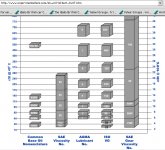Ed_K
Jedi Knight
Offline
After reading every post on the forum about the dashpot dampers and oils that could be used, I came up with this list. I am trying to put them in order of viscosity but I don't know what several of them are indicated by " ??w ". If you know one or more of them, please post. I want to experiment by using no oil in my dashpots and then work up from 0 viscosity until the car accelerates without back firing or hesitating ( after it is fully warmed up).
Here is what I found in the old pages of this forum;
1.. Use nothing at all 0
2.. Singer sewing machine oil ??w
3.. Marvel mystery oil 3w
4.. Three and one oil ??w
5.. Motorcycle front fork oil 20w ?
6.. ATF fluid( didn't say which type) 5-20w
7.. Expensive oil sold for this purpose ??w
8.. Motor oil 20w (never seen it)
9.. Motor oil 30w
10. Motor oil ( multi viscosity ) ??w-30
Thanks
I think the key to optimum acceleration with SU carbs is to use the lowest viscosity dash pot damper oil that your car will tolerate.
.... I can't get the list to display lined up ?
Here is what I found in the old pages of this forum;
1.. Use nothing at all 0
2.. Singer sewing machine oil ??w
3.. Marvel mystery oil 3w
4.. Three and one oil ??w
5.. Motorcycle front fork oil 20w ?
6.. ATF fluid( didn't say which type) 5-20w
7.. Expensive oil sold for this purpose ??w
8.. Motor oil 20w (never seen it)
9.. Motor oil 30w
10. Motor oil ( multi viscosity ) ??w-30
Thanks
I think the key to optimum acceleration with SU carbs is to use the lowest viscosity dash pot damper oil that your car will tolerate.
.... I can't get the list to display lined up ?

 Hi Guest!
Hi Guest!

 smilie in place of the real @
smilie in place of the real @
 Pretty Please - add it to our Events forum(s) and add to the calendar! >>
Pretty Please - add it to our Events forum(s) and add to the calendar! >> 




 in your garage.
in your garage.